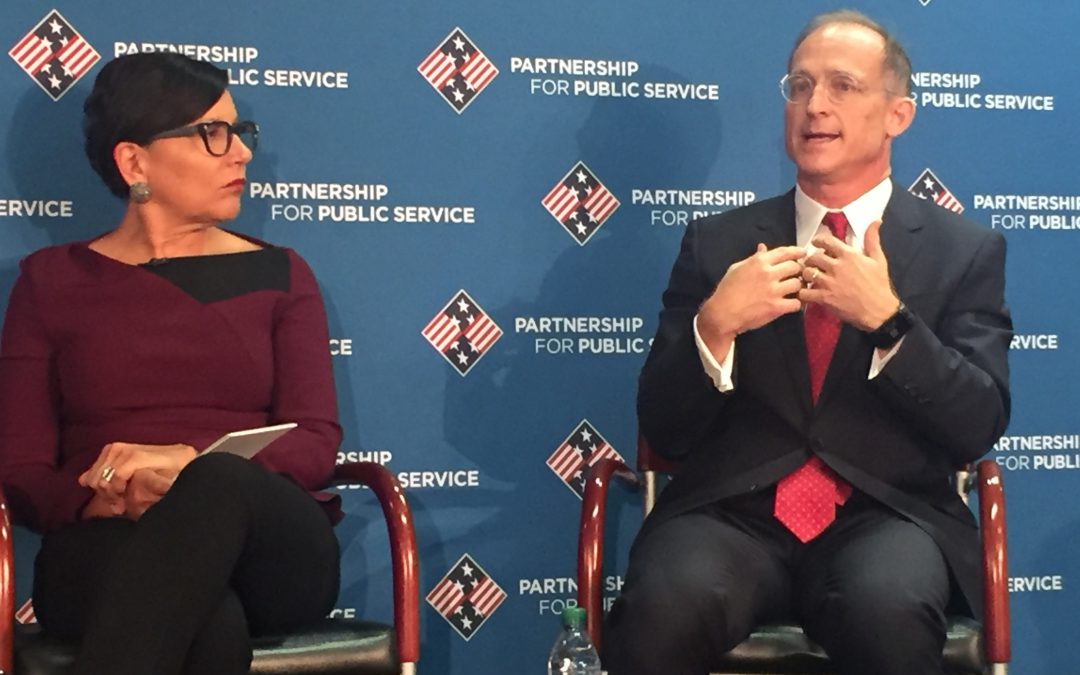WASHINGTON— With a new team coming to town in January, Secretary of Commerce Penny Pritzker and former Secretary of Housing and Urban Development Steve Preston urged future cabinet officers to incorporate private sector practices as a way of improving communication and management.
The speakers offered advice on streamlining the presidential transition process Wednesday, addressing about 40 people at the Partnership for Public Service, a nonprofit and nonpartisan organization.
Pritzker and Preston discussed “breaking down” the formal, stratified structure of a large department. As seen in traditional businesses, this would ease intradepartmental communication and general responsiveness.
“As a leader you can set that tone, you can talk about responsiveness,” Pritzker said. “We think of ourselves as being in a service business, and being responsive is part of what we do. The more you can do to develop trust and greater transparency I think, in this city, buys you more credibility.”
“Nobody,” she said, “just gives it to you because you show up and somebody gives you a title.”
An August Gallup survey showed that 55 percent of Americans negatively view the federal government, which is once again ranked last among all industries in the poll. They rated business and industry sectors much more positively.
According to the partnership, this evidence could suggest that government should be run more like a business, although there are many differences between the two sectors.
Pritzker and Preston both come from the business world.
Before her time as commerce secretary, Pritzker founded and served as the advisory board chairman of Skills for America’s Future, a national initiative working with employers to develop training mechanisms for workers. She was also the CEO of PSP Capital Partners, started five companies, led dozens of businesses and served on the boards of major corporations such as Hyatt Hotels.
Preston, who is now the CEO of Livingston International, served as HUD secretary under George W. Bush and as the Administrator of the U.S. Small Business Administration before that. In the private sector, he served as senior vice president at Lehman Brothers and First Data Corp., and eventually was the executive vice president and chief financial officer at the ServiceMaster Company.
Having both worked in the private and public sectors, the speakers said government agencies need rank and file staff with private sector skills, as well as top-level leaders to drive management and be effective messengers.
Unfortunately, it’s hard to find people to fill administrative positions in a system with checks and balances, Pritzker said.
According to the partnership, on average, nearly a third of top political appointments were vacant during the first year of Bill Clinton’s, George W. Bush’s and Barack Obama’s administrations.
Pritzker said 80 percent of the leadership of cabinet agencies was vacant when she was confirmed at Commerce in May 2013.
“We don’t have the flexibility in how to hire, we don’t have the flexibility in terms of paying because we’re competing with the private sector,” Pritzker said. “We’re trying to take a page from the private sector and really bring in the capacity to have more shared services in specific functions within our organization.”
Preston agreed. He said, “We certainly can cast a wider net” for administrative staff instead of simply choosing from the list of candidates provided by the federal Office of Presidential Personnel.
This event was one of the partnership’s efforts to create a comprehensive learning system for transition teams, CEO and President Max Stier said.
Although Pritzker and Preston didn’t directly address the 2016 campaigns, Stier said the partnership collected information from transition teams in the 2012 election and made it available to Democratic nominee Hillary Clinton’s and Republican nominee Donald Trump’s teams.


